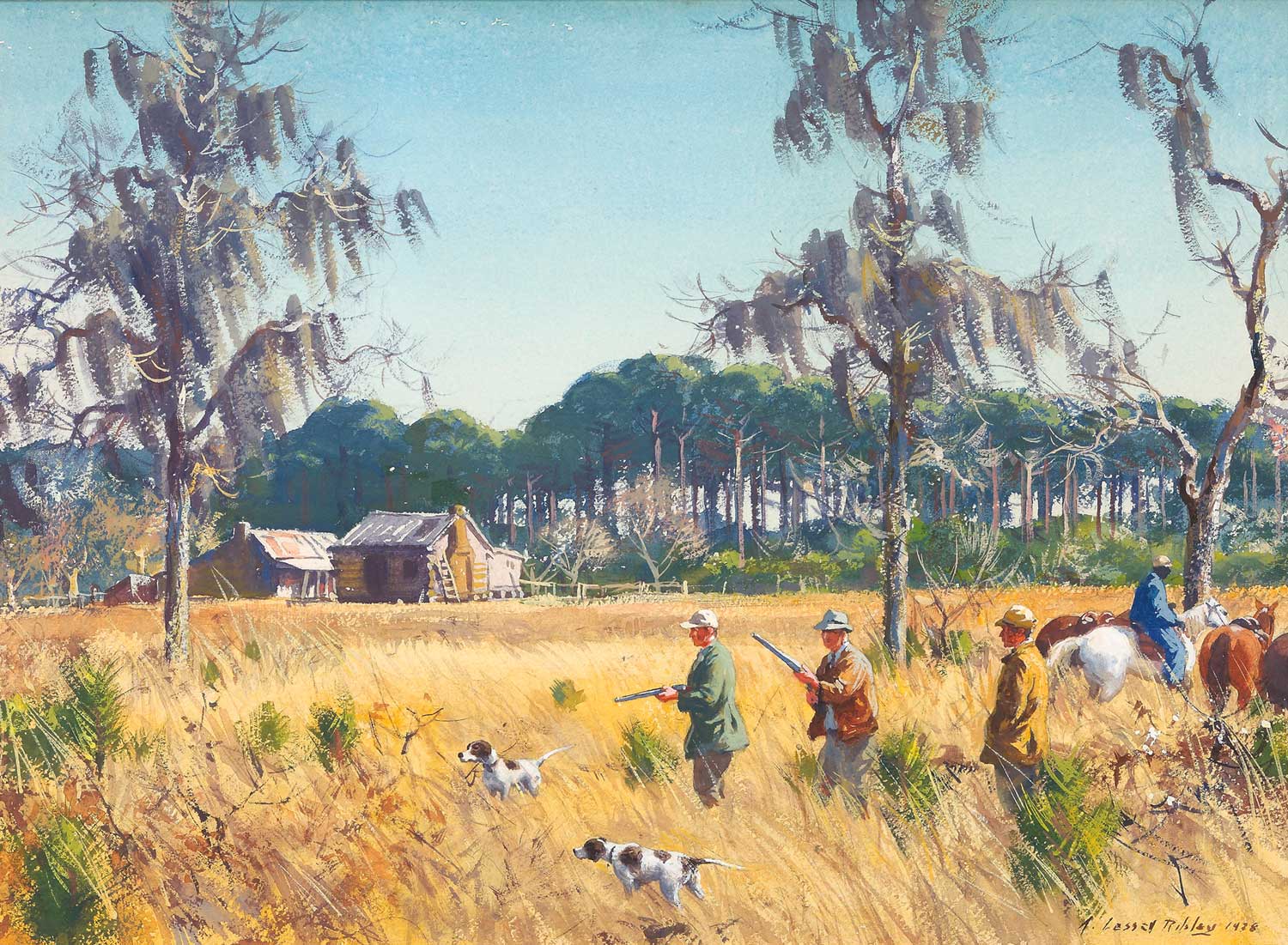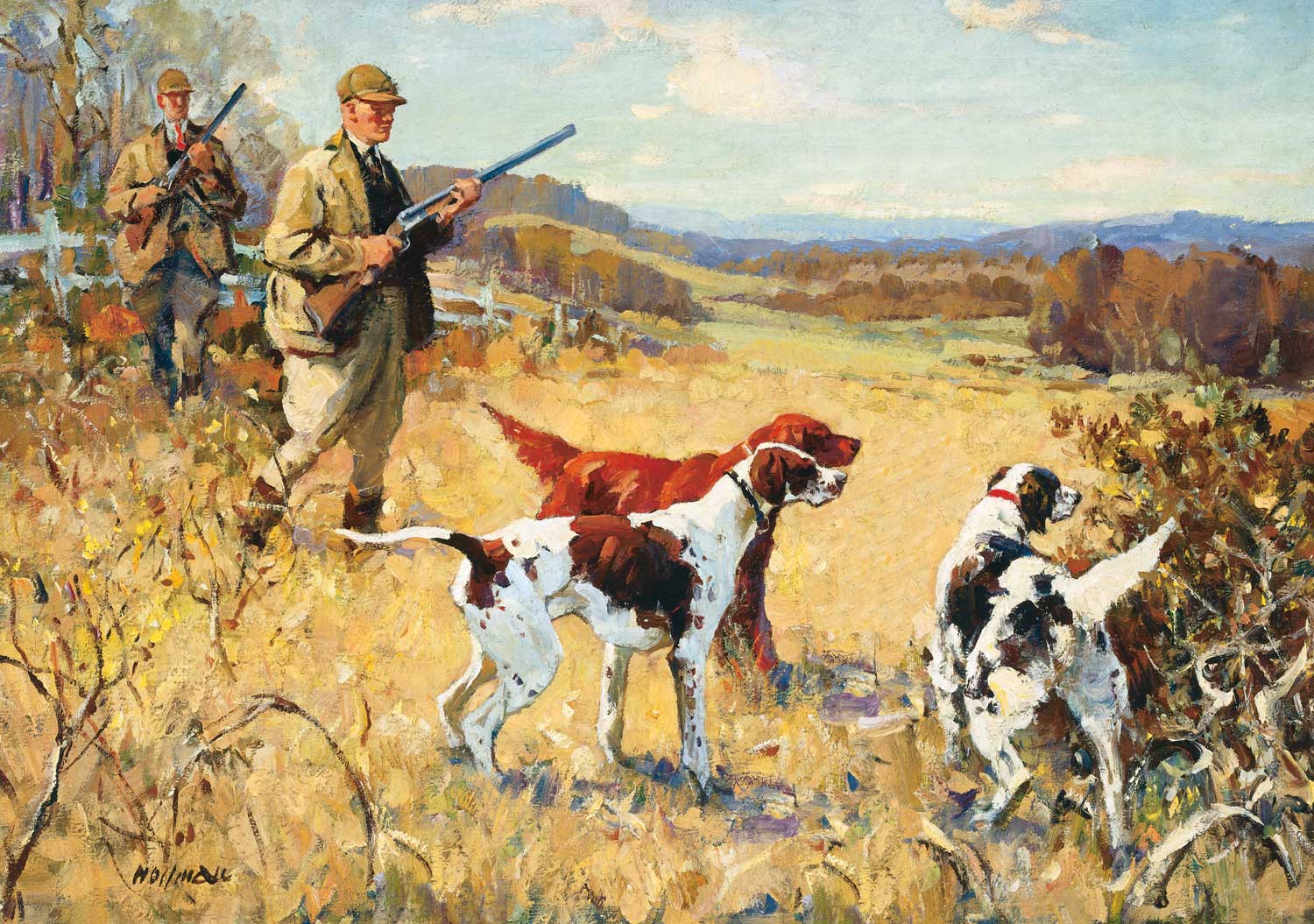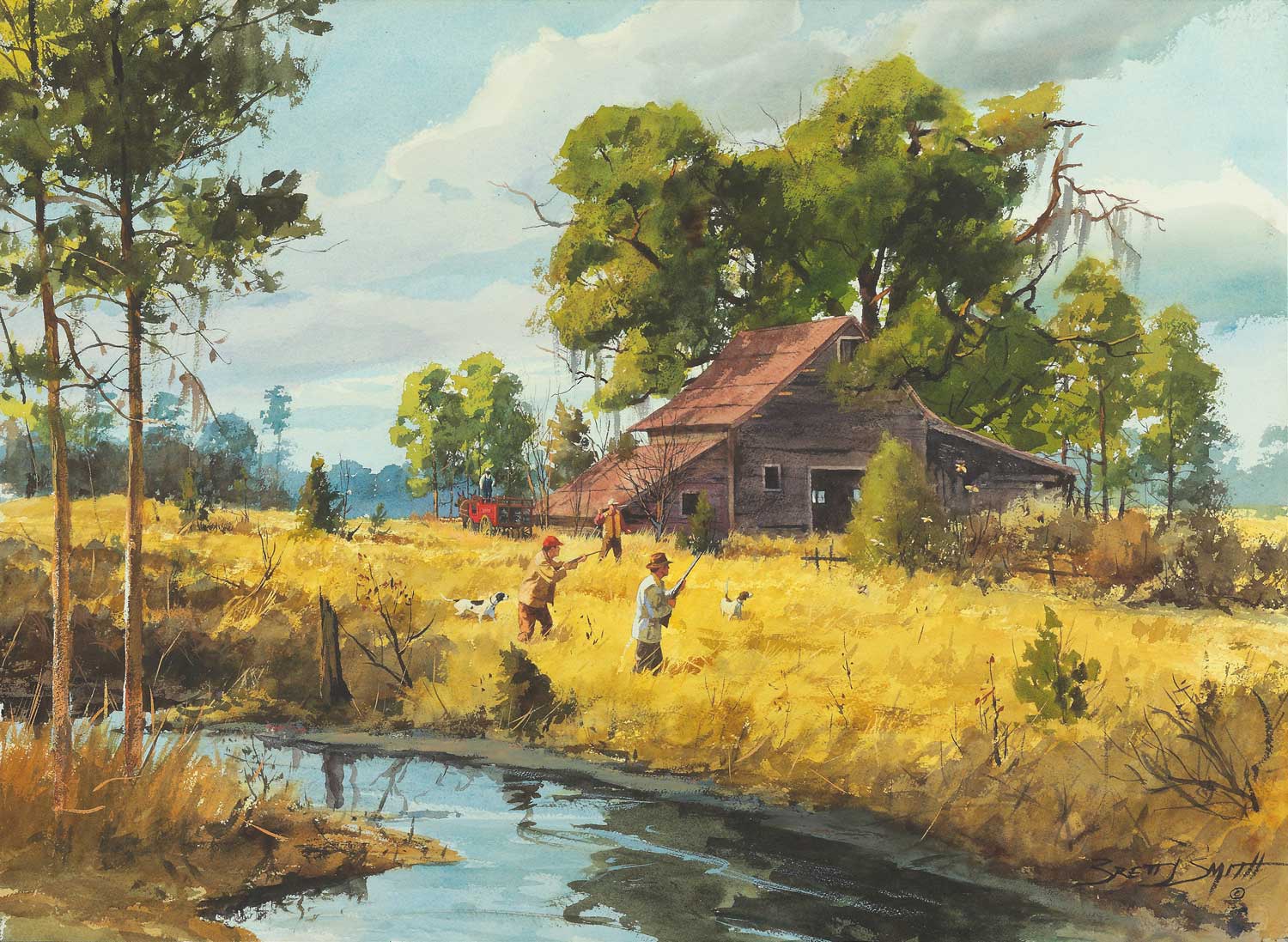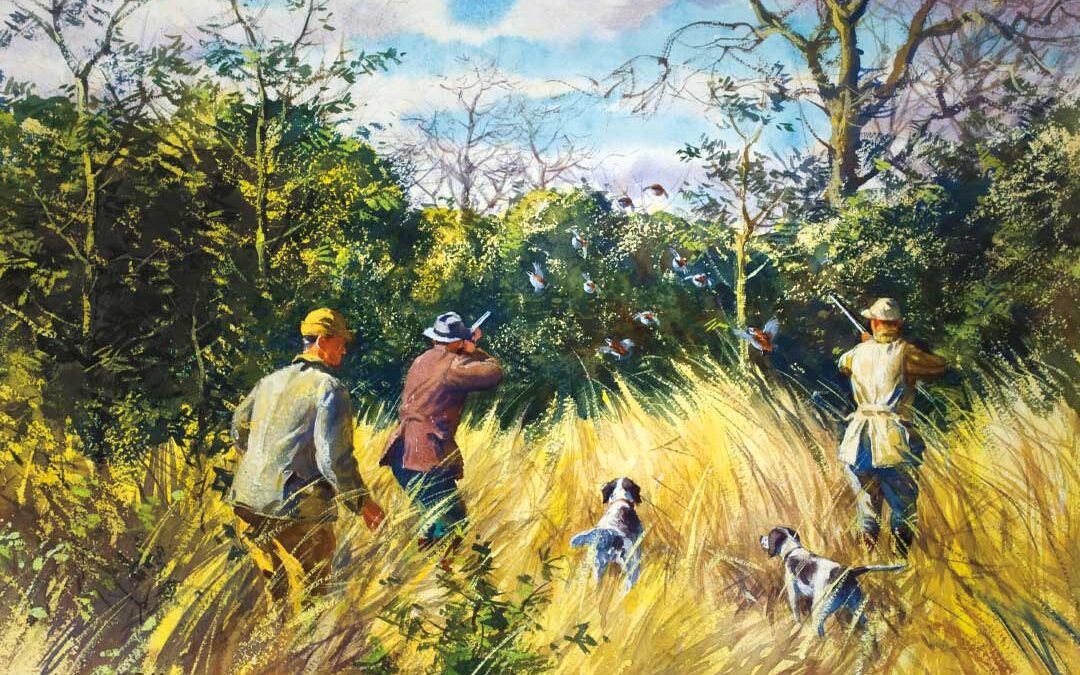The other day, while rummaging around in the attic for an air rifle with which to instill some respect for authority in the blue jays that had been raiding my roasting–ear patch, I chanced upon something more interesting than what I was looking for. This may well happen when one lets things accumulate in an attic.
My find was an ancient Parker double, and I remembered that I once called her Fallen Lady. Not inappropriately either. For it should have been apparent to any kindly and discerning eye that the aged fowling piece had been quite a lady in her day.
But that was before she came into my possession; by that time the hardy old trouper bore ineffaceable scars of time and hard usage. I smiled sadly, fingering the well-remembered gash in her once-comely stock. Turning the gun over, I glanced curiously at the small placard tied to the trigger guard. In a script still bold it proclaimed some of the feats that had brought renown to Fallen Lady in younger and braver days: 9 out of 10; 10 out of 12; 12 out of 14; 9 straights; 14 out of 16; 12 out of 13; 12 out of 14, and 15 straights.
I also remembered – how could I ever forget! – the circumstances under which Fallen Lady and I first met, and how in bargaining with Unc Spiller for her, I had to compete against myself. Nor would I forget the great but temporary elation the eventual acquisition of the gun brought me.
There is a notation at the bottom of the placard that I still consider valid: “Beyond peradventure the finest gun a bird hunter ever put to his shoulder.”
Well do I recall when this praise was heaped on Fallen Lady. It was after luminous and forever-living day when I downed 15 straights while hunting on the plantation of Bernard Baruch.
I’d just bet, I thought that day in the attic, that I could still take Fallen Lady out and get nine out of ten. And the way I’ve been shooting her lately . . . but I knew I wouldn’t try it, that when I worked out plans for coping with the scoundrelly jaybirds, I would leave Fallen Lady in the attic. But before going downstairs, I’d settle back in a limpsy old Boston rocker and have a sentimental tête-à-tête with Fallen Lady about the good old days when ignorance was in truth bliss.
One of the charms of the university in which I have been professoring between hunting seasons since Hector was a pup is its nearness to the spacious Carolina low country, where bird hunting ranks next to politics as a recreation. Forty-seven percent of the boys who attend the university are low-country bred; 29 percent are bird hunters; and 11 percent (either because they want to brag about seeing “the old man” miss a bird, or see nothing immoral about polishing an occasional apple) invite me bird hunting.
After 35 years, a vague rumor still persists that the easiest way to pass English 129 is to take me hunting, a rumor arising no doubt from the coincidence that students who hunt with me make better grades than those who don’t. It is a rumor that, however ill-founded, I have naturally made no great effort to dispel. As a matter of fact, my English 129 students are generally a pretty slick lot. They buy corner lots, are never caught using hand mashies in sand traps, never draw to fill an inside straight, and can toss a royal Coachman into a hat at 50 feet – if the hat is big enough.
But now and then one of my enterprising scholars will outstrip the rest. There was Tip Kincaid, for instance. He turned out to be quite an industrialist: he had industry enough to marry a lot of Yankee money. And his beautiful wife came down to the Carolina low country and bought a fine plantation for Tip. That is about the best use to which Yankee money can be put, and I hope more of it will be devoted to such use before I retire from hunting.
The first step that Tip Kincaid – the rumor still lives that his grandfather really christened him Tippecanoe And Tyler Too – took to improve his wife’s property was to build up its quail population, and when he invited me down, his place offered probably the best hunting in the state. But the invitation could have not have possibly come at a worse time.

Cabin Covey by Aiden Lassell Ripley – Courtesy Peter Villa
The dictionary defines a slump as “an unaccountable decline in effectiveness” and says it is a “phenomenon to which athletes and others are subject.” I belong to the “and others.” And “phenomenon” would just about have fitted the shooting slump I was found in at the time. Looking back, I know it to have been the most frustrating trip ever taken in the whole of my long and devious career.
Now, there is no predicting the duration of a slump. “All you know about luck for certain,” said the gambler John Oakhurst, “ is that it’s bound to change.” I suppose it’s that way with a slump. In desperation I changed shells, changed guns, and I changed my glasses, turning my bifocals in for trifocals; and I hungrily consulted everybody consultable, but I still couldn’t have hit a bullbat with a washboard. I could deliberately trigger both barrels at a bird in the wide open without accelerating its exit or causing it to revise its itinerary. This is the crowning humiliation of a bird hunter.
After a month of slumping misery, I not only lost every vestige of self-confidence, but concluded that I was the victim of some galloping form of deterioration and not long for this world. It was while I was wallowing in what Pilgrim’s Progress calls the Slough of Despond that Tip Kincaid’s hunting invitation came. Tip, who was a fine shot himself, had been bragging to his wife about my shooting, and she was keen on going along to watch. Accepting the invitation was out of the question, but Tip and Pam were lovely people, so I called and tried to extricate myself gracefully.
Tip said he wouldn’t hear to my not coming. I was underrating myself, he insisted, and exhibiting my “characteristic” modesty. Besides, he added, in Pam’s zeal to become a southerner, she was learning to cook chicken bog and squirrel pilau and wanted me to sample her culinary masterworks.
A Virginian by birth, I like everything about South Carolinians except their weakness for “bogs” and “pilaus” of one kind or another. These concoctions are too Democratic for me, their perpetrators having no qualms about tossing the omnium-gatherum whatever is not otherwise disposable. I once saw a scorpion fall into a pot of pilau, and the clerk of works didn’t bat an eye. So I could forgo Pam’s Rebel experiments without feeling I had let the Confederacy down.
“Pam has also invited some folks to meet you,” Tip added, “and she’ll take a dim view of your not coming.”
Right then I wasn’t interested in being met, but I didn’t want to disappoint as nice a person as Pam. And it occurred to me that if I should outlive my slump, however improbable that seemed, I might want to be invited again. So I packed my miseries and went.
“Where’s your gun?” asked Tip.
“Didn’t bring it. I’ve no idea of letting you brag about seeing me miss ten straight the next time you’re on campus.”
“No matter,” dismissed Tip. “There must be a dozen guns at the lodge. You can take your pick.”
“It’s not the gun, “I explained. “It’s me. I couldn’t hit an elephant with a BB gun. So I’m going to drive the Jeep for you and Pam.”
I was adamant to all argument. No use for a man to make a fool of himself. Throughout the morning I stuck to my unhappy decision. But late afternoon my role of nonparticipant was interrupted by what I regarded as pure providence. I was alone in the Jeep at the time, Tip and Pam having followed a bunch of singles on foot; and just as the Jeep turned a bend I glimpsed a big covey deploying gently in a patch of brown Carolina fern.
What a beautiful sight, I thought, suddenly wishing I had brought a gun along. Then out of the woods came a figure with a bunch of rabbits dangling from his belt and what seemed like a gun over his shoulder. Immediately I began to scheme. If I were to borrow that gun, take a crack at the just-lit covey, and miss, nobody would be the wiser.
“Is that a bird gun?” I asked eagerly.
“Nawsir, Cap’n. If you lookin’ for a bird gun you done come to a goat house for wool. Dis hear is a rabbit gun. Hit de very king-pin of rabbit guns!”
“I’d like to try it anyway . . . on that covey that just lit. May I?”
“Sho’ t’ing, Cap’n! She already loaded. Des’ step up politely and pull the trigger.”
Walking forward, I kicked up the birds and shot. To my amazement and disbelief, two bobwhites fell.
“They were the birds I shot at!” I said foolishly.
I had no recollection of putting the gun up or of pulling the trigger. It seemed to have shot itself. That feeling, I have since decided, is the touchstone of perfect gun fit. Pocketing my birds, I again swung the gun to my shoulder and was charmed by the effortlessness of the movement. Here, I said, is the rarest of rarities, a natural.
“I’d like to rent your gun awhile,” I propositioned. “I’ll pay you.” Discerning a possible hesitancy in the owner’s eye, I added, “I’ll pay you well.”
“About how much mout that be?”
I paused for a moment. I should have paused longer. “Seven dollars?” I said hopefully.
Later I was to rue my prodigality, but at the time I was in a state of delirium and such a material thing as money was of little consequence. Considering the amount I could have been taken for, I supposed I got a bargain anyway. But it taught me one thing: a happy man is pretty apt to be a sucker. Hard bargains, I think, are mostly driven by sad men.
“Seven dollars,” I repeated, in case the rabbit hunter hadn’t heard. “Seven dollars for the rest of the day.”
“Cap’n, you have employed yourself a gun.”
Instantly I was off to rejoin my friends and try the gun again. I had given it scant attention before shooting it, but now I regarded the gun with a new interest. Even a glance revealed that it had seen better days – had seen a great many of them, in fact. The stock was timeworn, etched with the abuse of years. The barrels having been bedaubed with black paint, revealed little but that they had suffered hard usage.
But right then I was interested in other things than the gun’s appearance, and when I overtook my friends just as they were approaching a point, I called, ”Hey! Put my name in the pot!”
Again I doubled, and again I was conscious of no exertion, the gun seeming to shoot itself.
“What in the world have you got there?” demanded Tip. “And if you call that a slump I hope it’s contagious. But why have you got Unc Spiller in tow?”
“This is his gun,” I explained. “I borrowed it back there and got a double, and have rented it for the afternoon.”
“Since you’ve got your shooting eye back, we’ll run back to the house and get you a gun. Wait! Did you say you’d rented that gun from Unc Spiller? You mean he’s charging you for that piece of junk?”
“Careful!” I laughed happily. “You are speaking of someone near and dear. And any fiscal arrangement that may exist between Unc Spiller and me is purely personal. Now let’s get back to hunting. We’ve got a full hour left.”
When the afternoon ended I had 12 of 15, and my jubilation will be appreciated only by those who have finally broken through a prolonged slump. Stepping aside, Unc Spiller and I transacted a little private business to the satisfaction of both parties; then I said, “Since I’m renting your gun again tomorrow, what about me letting me keep it overnight?”
“Mout go coon huntin’ tonight” Unc Spiller demurred, “and de gun mout come in handy.”
“Doc, you’ll never get rich!” laughed Tip Kincaid as we sat around the fireplace that night. “Seven dollars a day rent for a ten-dollar gun! Why, that old wreck has been kicking around the neighborhood since the year one and has probably killed more varmints than any other gun in the country. But bird gun? Don’t make me laugh, Doc. Unc Spiller should be indicted for grand larceny for charging you for it.”
“Nice being a sucker if you can afford it,” I grinned.
“But seven dollars a day! If you are bent on using that antique, I’ll re-negotiate the terms with Unc Spiller tomorrow,” offered Tip. “He owns a small place adjoining ours and we overlook his rabbit hunting. I’m sure he’ll listen to reason.”
“Thanks, no – the deal between Unc Spiller and me is mutually satisfactory. If you butt in, I’ll tell Pam about the time you almost got shipped for putting a cow in the chapel tower.”

My shooting the next day confirmed my high regard for Unc Spiller’s gun. For me it was the quailing piece nonpareil, and as we chatted about the hunt that night, Pam and Tip complimented me on my shooting, and Tip promised to do some bragging on the campus when he came up for the game. Then we all went in and ate Pam Kincaid’s squirrel pilau and a very savory but somewhat puzzling dish that Pam called Confederate stew for reasons that elude me.
I drove home thoughtfully that night, revolving a most agreeable idea. And I didn’t wait long to put it into effect. Three days later I was en route to a low-country lodge to hunt with a couple of Washingtonians who were theoretically attending some high level to-do in Paris.
“I’ve been bragging about your shooting,” the lodge owner had written me. “I’d like for you to show these city slicks how to do it.”
So of course I drove 30 miles out of my way to rent Unc Spiller’s gun, and another 30 when I returned it that night. Under no conditions would Unc Spiller consent to my keeping the gun overnight.
Three times during the week following I sneaked by Unc Spiller’s and rented his gun. And kept this up week after week. I had no complaint, because I was running up almost incredible strings on every hunt, but the countless side trips to Unc Spiller’s was running me ragged – and doubtless making me look like an idiot.
Why not be sensible, I said, and buy the gun? Surely Unc Spiller, alert man of business that he was, would be approachable. I would overture him the next time I went by.
But Unc Spiller, chomping on a raw sweet potato, wagged his head dubiously. “Cap’n, I’d des’ as lief keep dis gun. Matter of fact, I can’t afford to sell it.”
“You can’t afford to sell it? Why?” I puzzled.
“I kin make mo’ money by rentin’ it,” he replied blandly between chomps. “Yessir, I sho’ got myself a fat possum!”
Then, as if talking to a total stranger, he delivered himself of a weighty opinion: “You know what’s a fact? Seven dollars a day ain’t hay! Kin I peel you a tater, Cap’n?”
If ever a man had painted himself into a corner, it was I. the raw humor of the situation hit me between the eyes. By a hasty reckoning I had paid Unc Spiller $105 thus far. He did indeed have himself a fat possum.
A day or so later it occurred to me that if I couldn’t persuade Unc Spiller to part with his gun, I could do the next best thing; have my gun remade into a facsimile of his. In every particular my gun would be identical to his, and two guns exactly alike must certainly shoot alike. Why hadn’t I thought of this before?
So I went down to Unc Spiller’s and dissembled his gun, and weighed and measured every part with minute accuracy. Then I hired the best local gunsmith I could find and paid him $100 for ruining a good gun. I couldn’t hit the ground with it at four feet.

Fields In Autumn by Brett James Smith – Courtesy Peter Villa
The hunting season closed and I still hadn’t separated Unc Spiller from his gun. But now I had eight months to maneuver in before another hunting season. During that time Unc Spiller remained obdurate. With the hunting season only a month off, I accepted a three-day hunting invitation from a friend in Georgia who planned to pit me against two crack New Englanders – “to uphold the honor of the Confederacy.” But I was at my wit’s end in jockeying with Unc Spiller.
Then, just before opening day, my luck veered. Tip Kincaid phoned and said, “What do you know! Unc Spiller’s planning to commit matrimony!”
“Good. Extend my felicitations to him.”
“He wants to marry a young girl,” Tip particularized.
“More power to him,” I said, “but how does this affect the price of eggs?”
“She demands a TV set, and Unc Spiller says he can’t afford one unless he sells his gun.”
“That does affect the price of eggs!” I quickly agreed. “I’ll be there in two hours.”
“Good. Pam will have Confederate hash and chitterlin’ pilau ready.”
“Fine!” I said, but I thought to myself, That girl is gonna kill off the South with her patriotic cooking.
A few hours later Unc Spiller and I, after considerable backing and filling, concluded a deal. I ardently hoped that his new wife would bring him as much happiness as the old gun would bring me.
Then I went by the Kincaids for a visit and my bout with Confederate stew and chitterling pilau. Back at home, still shaken, I hurried to my room and locked the door against interruption. Tomorrow I would give those New Englanders a lesson in the art of eye-wiping, but right now I would gloat over my beauty alone. I’d doll her up just a bit. Later, I’d remove the old paint from the barrels and have them re-blued, of course, but right now I’d merely hit the high spots, like that paint smudge on the left barrel.
Daubing it with a little paint remover, I waited a moment, then brushed the paste off. The exposed metal didn’t look quite right; it seemed to have a spiral pattern. I stopped dead still, a chilling suspicion at my throat. Then, removing the forearm, I went vigorously to work with an emery cloth. Again the telltale spirals leaped at me.
The sickening truth was irrefutable: the barrels of my precious gun were visibly, unmistakably and irreparably Damascus, made in the old black-powder days by twisting strip steel around a mandrel, then heat-welding it. For unnumbered years Damascus barrels were highly regarded, but the coming of smokeless powder doomed them. In simple fact, nitro loads blew many of them apart, with resultant damage to the shooters.
But Unc Spiller’s gun was surely an exception, I argued. Hadn’t he and neighborhood varmint shooters used it for years? And probably with heavy loads, for Unc Spiller had spoken of hunting deer and bear with it. I’d shot it myself without mischance. Shucks, I’d banish silly fears and use it regardless. Those brash New Englanders must be taught a lesson tomorrow. But the stark admonition on a shell box stared me down: “Do not fire these shells in a gun having Damascus or other twist-steel barrels.” I looked at my fingers, lovingly flexed them, and decided I wanted to keep them.
However, on the drive to the low country next morning, I kept reassuring myself about the gun’s safety. I must not have done a good job of it, because I had a pretty sad day. After I missed seven birds straight, one of the New Englanders said, “I notice that you duck every time you shoot, and count your fingers. Are all Southerners gun-shy?”
During the afternoon, though, he got a taste of crow: I borrowed a gun from him and beat him with it.
Since that time I have often thought of Fallen Lady and of our brief but fruitful romance. I came out that experience with a conviction I have since verified again and again: the feeling a gunner has toward his gun is part of the gun.
Well, I said, getting out of the Boston rocker and working the kink out of my back, if I don’t get to work, those damned jaybirds will eat me out of house and home. So I eased Fallen Lady back against the chimney, gave her a fond salute, and said, “Ave atque vale, old girl!” If you don’t understand Latin, that means it’s a long time between drinks, as the Governor of North Carolina said to the Governor of South Carolina. Or was it the other way around?”
Note:“Fallen Lady” is from Jaybirds Go To Hell on Friday published in 1964 by Holt, Rinehart & Winston.

